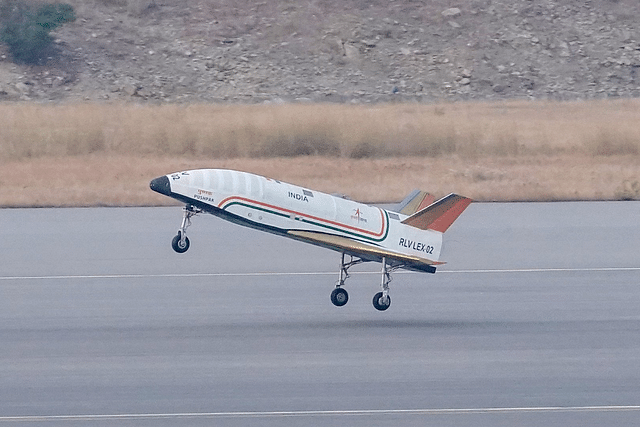SOURCE: IDRW.ORG


The Indian Space Research Organisation (ISRO) is inching closer to its Reusable Launch Vehicle (RLV) program with the upcoming third and final RLV landing experiment (RLV LEX).
“We’re progressively raising the difficulty level with this mission,” said Dr. Unnikrishnan Nair, highlighting the increasing complexity of the tests. The RLV-LEX missions involve an unmanned winged prototype, named Pushpak, being taken to a predetermined height and released for a controlled landing under various conditions. In the upcoming LEX-03 mission, Pushpak will be carried to a height of 4.5 kilometers, but with an added challenge – it will be released 500 meters sideways from the runway, compared to the 150 meters in the previous LEX-02 mission.
“Pushpak will need to autonomously navigate towards the runway, making adjustments in its cross-range, downrange, and altitude to achieve a safe touchdown,” explained Dr. Nair.
LEX-03 will specifically focus on reducing the sink rate, which is the rate of descent, to minimize the impact load during landing. The mission will also see the inclusion of a real-time kinematics (RTK) package for enhanced precision. Additionally, the team will address the challenge of handling tailwind conditions during landing.
Following the successful completion of the LEX program, ISRO’s RLV-TD project will progress to using an unmanned Orbital Re-entry Vehicle (ORV). This vehicle, 1.6 times larger than Pushpak, will be launched into a 400 km orbit using a modified Geosynchronous Satellite Launch Vehicle (GSLV). This mission is anticipated in the next two years.
The ORV mission will involve various in-orbit experiments, including testing a thermal protection system for re-entering Earth’s atmosphere and a retractable landing gear system.
This incremental approach by ISRO demonstrates a steady progress towards developing a fully functional reusable launch vehicle, a significant feat in the domain of space exploration.
NOTE : Article cannot be reproduced without written permission of idrw.org in any form even for YouTube Videos to avoid Copy right strikes. Websites doing illegal reproductions will get DMCA and Legal Notices.